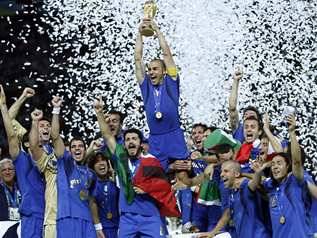 Italy won the World Cup as everyone knows, unless you are a nativist American who knows only one football. But there are more important things to gain from the World Cup than a priceless beer at your friend's cost. And there are bigger conquests than even that of Italy's finest, that deserve to sing veni, vidi, vici.
Italy won the World Cup as everyone knows, unless you are a nativist American who knows only one football. But there are more important things to gain from the World Cup than a priceless beer at your friend's cost. And there are bigger conquests than even that of Italy's finest, that deserve to sing veni, vidi, vici.
The Carnegie Endowment delivers the economics of the World Cup: globalization is at its fittest when actors can move seeemlessly across borders. Naturally the result is inequality, where talent is concentrated, and as a result, fewer teams qualify for the finals. However, a surprising complication makes it interesting:while we see inequality and exclusion in club-level football, the opposite is true for competitions between national teams.
Why is this?The elite eight teams of the last four World Cups have included two “newcomers” that had never been quarterfinalists, such as Turkey and South Korea in 2002. There are again two reasons for this. First, free movement has meant that good players from small leagues improve much more than they would had they stayed home. ...Second, that improvement in quality was “captured” by national teams playing in the World Cup thanks to FIFA’s rule requiring players to play only for their national team. Eto’o can play for any Spanish, Italian, or English club, but in the national competitions, he can play only for Cameroon. In other words, FIFA has introduced an institutional rule that allows small countries (in the football sense) to capture some of the benefits of today’s higher-quality game, thereby partly reversing the “leg drain.”
A serious meditation on the World Cup bears some fruit on fair play in the wider areana of life. The quesion of how to take the benfits of globalization but off-set the iniquality is one that badgers those interested in development. From a purely economic standpoint, accounting for fairness is rational because we imperfect economic actors place great value on (and hence reap benefits of a kind from) bringing inequality into a range we find tolerable.
The same rule could be applied to other activities. Free movement of skilled labor could be accompanied by binding international requirements that migrants from poor countries spend, say, one year in five working in their countries of origin. They would bring home skills, technology, and connections that are as valuable as the skills that Eto’o, Essien, or Messi bring back to Cameroon, Ghana, or Argentina. Job placement would remain a problem, but the principle is sound: the world should learn from the World Cup.
11.7.06
che bello!
Posted by melanie at 9:04 PM
Subscribe to:
Post Comments (Atom)




0 Comments:
Post a Comment